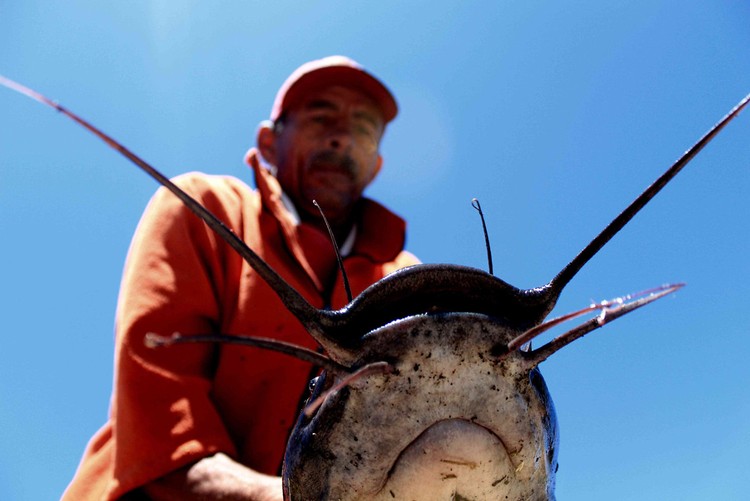Fresh water fishers demand formal recognition of their livelihoods
Masifundise inland fisheries report says sector needs government help
On Thursday, lobby group Masifundise released a report and documentary on inland fishers, calling on the government to formalise the sector. Archive photo of fisher Wayne Wilke by Masixole Feni.
Catching freshwater fish in rivers and dams around the country is the livelihood of small-scale inland fishers. They want the Department of Forestry, Fisheries and the Environment (DFFE) to formally recognise their sector.
This comes after Masifundise, a small-scale fishing community lobby group, released a report and a documentary on inland small-scale fishing on Thursday.
The report focuses on three large dams – the Gariep in the Free State, the Jozini in KwaZulu-Natal, and the Vanderkloof in the Northern Cape.
Masifundise spokesperson Jordan Volmink said their research showed that with high levels of unemployment, inland fishing was “fulfilling local livelihood needs”.
Jacobus van Wyk, who fishes in the Gariep dam, said, “The living crisis is getting worse. Poverty is increasing. The government must intervene immediately and bring about change.”
The Masifundise report makes several recommendations, including prioritising the development of the sector, providing support to fishers, setting up provisional measures for fishers, and putting in measures for the inclusion of women in fisheries’ value-chains.
It raises several challenges faced by inland fishers. Access to the dams is fenced off or limited by the need to cross private land, such as tourist establishments, or to pay conservation fees. The report found that some fishers in Jozini fished at night because they feared being criminalised.
The department’s draft National Freshwater (Inland) Wild Capture Fisheries Policy was approved by cabinet in 2021, but the policy is yet to be implemented.
The policy guides the development and management of the sector, including such issues as access rights and harvest quotas.
“It has been long that they’ve struggled,” said Sabelo Mabaso, an official of the Jozini Local Municipality. He asked at the online launch that the department put in provisional measures to allow fishers access to the Jozini dam. Mabaso said the fishers struggled “because they are not licensed”. The municipality wanted to buy the fishers a safe boat, but government can’t easily support an activity done “illegally”.
In response, a co-management meeting to “start dealing with some immediate issues the community is having” was proposed by Kishan Sankar, a DFFE official at the Masifundise launch. He said the department is committed to taking the sector seriously and working with communities.
Sankar said a big challenge was that the department did “not know where all the fishers are in the country”. The DFFE is currently doing surveys to collect more data.
Next: Children frolic in flood water as only pool in Brown’s Farm remains closed
Previous: Cape flood: homes buried in mud
Letters
Dear Editor
It is heartbreaking to see that most of the dams and rivers are not taken care of by local authorities. Dams that are taken care of are governed by "catch and release" rules while local people are starving. Why not clean the dams and control the catching of fish? It is disheartening to see some of the so-called elite catching fish and releasing them while nearby poor people are starving and jobless.
Dear Editor
Why must people suffer when there are resources out there? Why must a handful of people decide the fate of the masses when there are many fish in our dams yet we get stopped from fishing? We are being stopped at Zeekoeivlei from fishing. Let's hope that very soon those that prevent us from putting food on our tables will fix this.
© 2023 GroundUp. This article is licensed under a Creative Commons Attribution-NoDerivatives 4.0 International License.
You may republish this article, so long as you credit the authors and GroundUp, and do not change the text. Please include a link back to the original article.
We put an invisible pixel in the article so that we can count traffic to republishers. All analytics tools are solely on our servers. We do not give our logs to any third party. Logs are deleted after two weeks. We do not use any IP address identifying information except to count regional traffic. We are solely interested in counting hits, not tracking users. If you republish, please do not delete the invisible pixel.



